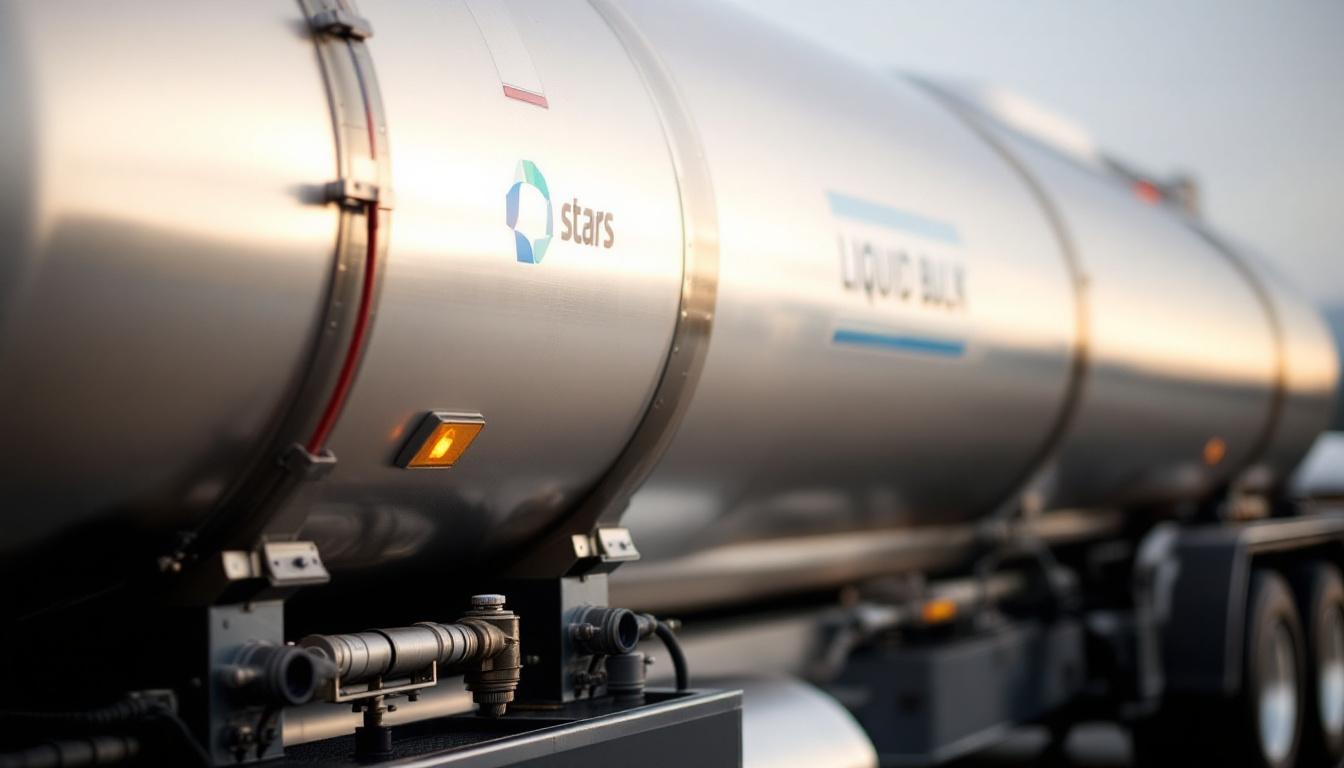
Choosing the Right Liquid Bulk Trailer for Your Needs
At GLOBAL TERMINAL NETHERLANDS B.V, we understand the importance of selecting the right liquid bulk trailer for your transportation needs. Choosing the optimal trailer can significantly impact your operational efficiency, safety, and bottom line.
This guide will walk you through the essential factors to consider when selecting a liquid bulk trailer, from different types to key considerations and safety features. We’ll also explore how the right choice can enhance your long-term success in the liquid bulk transportation industry.
Types of Liquid Bulk Trailers
The selection of the right liquid bulk trailer can significantly impact operational efficiency, product integrity, and transportation costs. This chapter explores the main types of liquid bulk trailers available in today’s market.
Stainless Steel Tankers: The Industry Standard
Stainless steel tankers offer a combination of corrosion resistance, durability, hygiene, and versatility, making them an excellent choice for liquid bulk transportation. These trailers are ideal for transporting a wide range of products (including chemicals, food-grade liquids, and petroleum products). Stainless steel tankers allow for easy cleaning and sanitization, which reduces the risk of cross-contamination between loads.
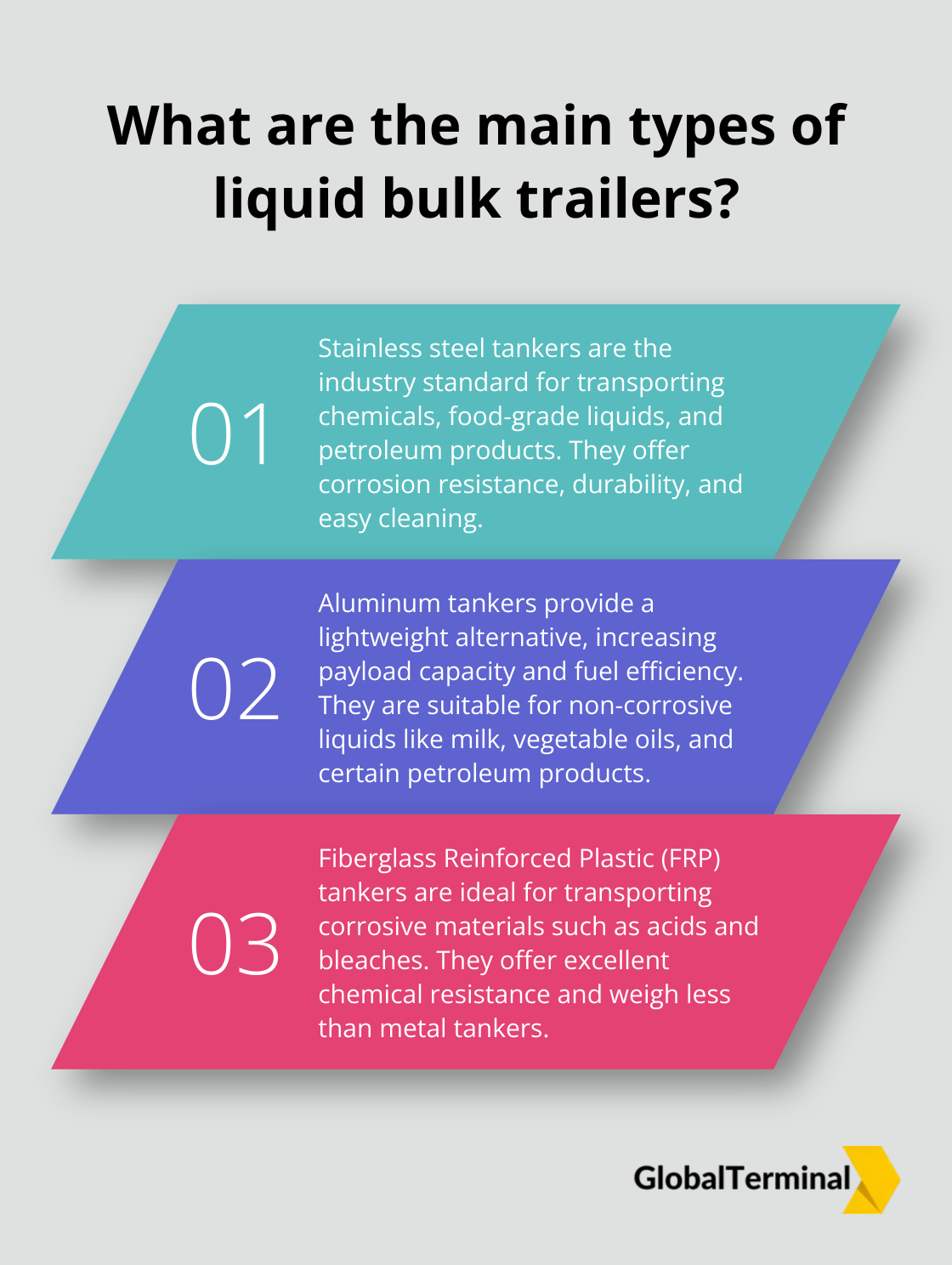
A key advantage of stainless steel tankers is their ability to maintain product purity. This feature proves particularly important when transporting food-grade liquids or sensitive chemicals.
Aluminum Tankers: Lightweight and Efficient
Aluminum tankers offer a lightweight alternative to stainless steel, providing increased payload capacity and improved fuel efficiency. These trailers suit non-corrosive liquids such as milk, vegetable oils, and certain petroleum products particularly well.
The weight savings of aluminum tankers can be significant. This weight reduction allows for larger payloads, potentially increasing profitability per trip.
Fiberglass Reinforced Plastic (FRP) Tankers: Corrosion-Resistant Solution
FRP tankers have gained popularity in the liquid bulk transportation industry, especially for corrosive materials. These trailers offer excellent chemical resistance and weigh significantly less than their metal counterparts. FRP tankers suit the transport of acids, bleaches, and other highly corrosive substances that would quickly degrade metal tanks particularly well.
While FRP tankers have a higher initial cost compared to metal options, they often provide a longer service life when used for corrosive materials. This can result in lower long-term costs and reduced maintenance requirements.
Insulated vs. Non-Insulated Options
Liquid bulk trailers come in both insulated and non-insulated varieties, regardless of the material. Insulated tanks prove essential for temperature-sensitive products, maintaining the cargo at a specific temperature range during transit. These tanks commonly transport asphalt, molten sulfur, and certain food products.
Non-insulated tanks, also known as “skin tanks,” suit products that don’t require temperature control. They typically weigh less and cost less than insulated options, making them a cost-effective choice for many applications.
When choosing between insulated and non-insulated options, consider not only your current needs but also potential future requirements. An insulated tank might provide more flexibility in the long run, allowing you to transport a wider range of products.
The next chapter will discuss the key factors to consider when selecting a liquid bulk trailer, helping you make an informed decision based on your specific operational needs.
Key Factors in Liquid Bulk Trailer Selection
Product Compatibility and Trailer Material
The liquid you transport dictates your trailer choice. Different materials interact uniquely with various liquids. Food-grade trailers are insulated stainless steel tanks that have a sanity valve (a special covering that protects the valve). Aluminum, though lighter, doesn’t suit all chemicals. FRP trailers excel with highly corrosive substances that quickly degrade metal tanks.
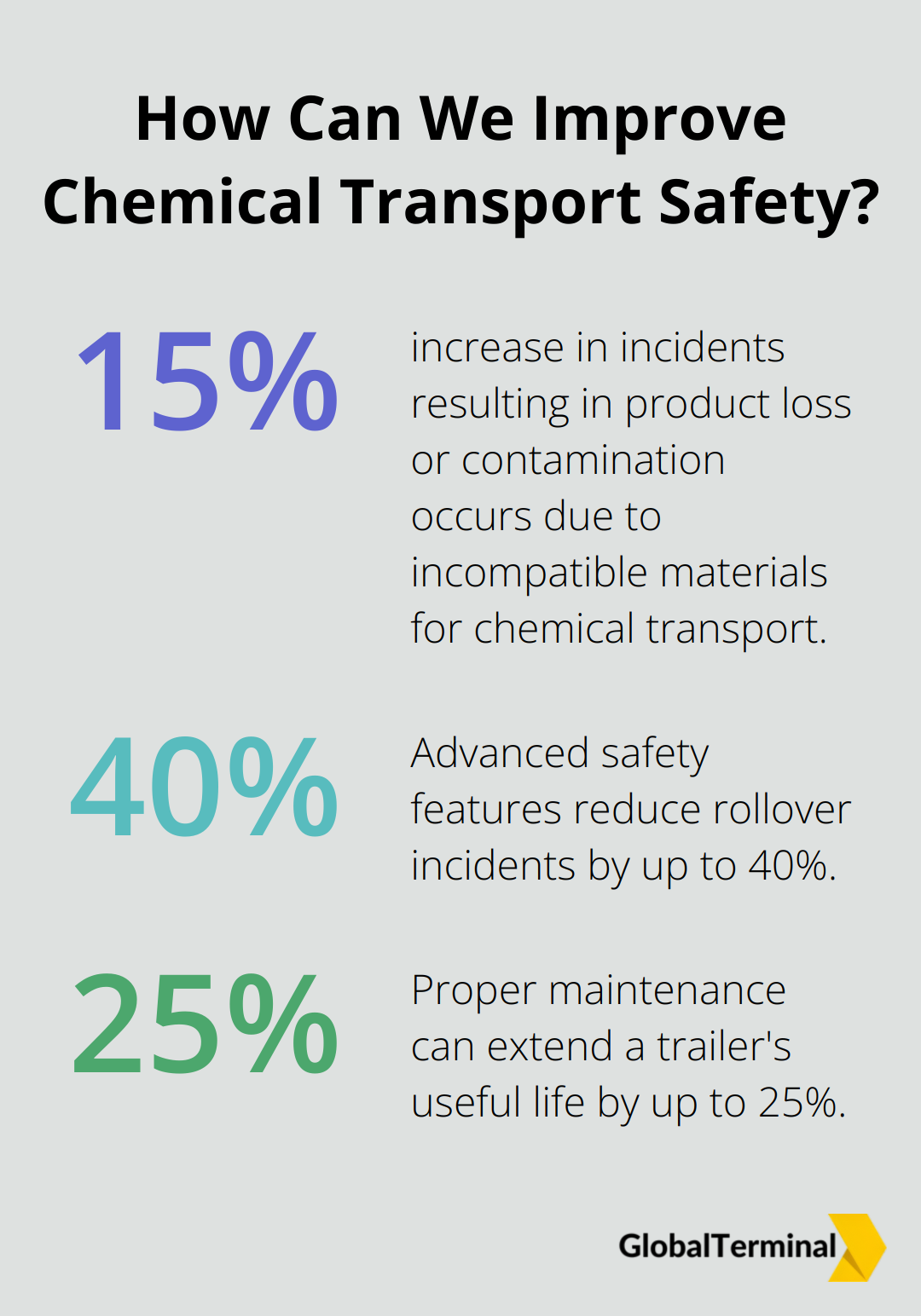
The American Chemistry Council reports that incompatible materials for chemical transport increase incidents resulting in product loss or contamination by 15%. This statistic highlights the importance of matching your trailer material to your cargo.
Capacity and Weight Considerations
Trailer capacity directly impacts your operational efficiency. Larger capacities seem more efficient but aren’t always the best choice. Evaluate your typical load sizes and route weight restrictions. Overloading trailers violates regulations and increases wear and tear, potentially leading to higher maintenance costs.
Route Analysis and Terrain Adaptation
Your operational routes influence trailer selection. Long-haul highway transport requires different features compared to short, frequent urban trips. For mountainous terrains, consider trailers with enhanced stability features and appropriate brake systems.
The Federal Motor Carrier Safety Administration reports that 29% of large truck crashes occur on non-interstate rural roads. This statistic emphasizes the need for trailers adapted to various terrains.
Regulatory Compliance and Safety Features
Industry regulations compliance is mandatory. Different regions and countries have varying standards for liquid bulk transportation. For example, the European Agreement concerning the International Carriage of Dangerous Goods by Road (ADR) sets specific requirements for tank construction and testing.
Trailers with advanced safety features significantly reduce accident and spill risks. The National Highway Traffic Safety Administration found that features like electronic stability control and tire pressure monitoring systems reduce rollover incidents by up to 40%.
Maintenance Requirements and Longevity
Consider the long-term maintenance needs of different trailer types. Some materials have higher upfront costs but offer savings in maintenance and longevity. Stainless steel trailers typically last longer and require less frequent repairs compared to aluminum trailers when used for corrosive materials.
The American Transportation Research Institute’s lifecycle cost analysis revealed that proper maintenance can extend a trailer’s useful life by up to 25% (significantly impacting the total cost of ownership).
The next chapter will explore how to enhance efficiency and safety in liquid bulk transportation, building on these key selection factors to optimize your operations.
Maximizing Safety and Efficiency in Liquid Bulk Transport
Advanced Safety Technologies
The implementation of advanced safety features in liquid bulk trailers reduces accident rates significantly. Improperly secured cargo can shift while the vehicle is negotiating a curve, thereby reducing roll or yaw stability. Sloshing can also occur, further compromising vehicle stability. We recommend the use of anti-lock braking systems, tire pressure monitoring systems, and rollover stability control. These technologies provide real-time feedback to drivers, allowing for immediate corrective actions.
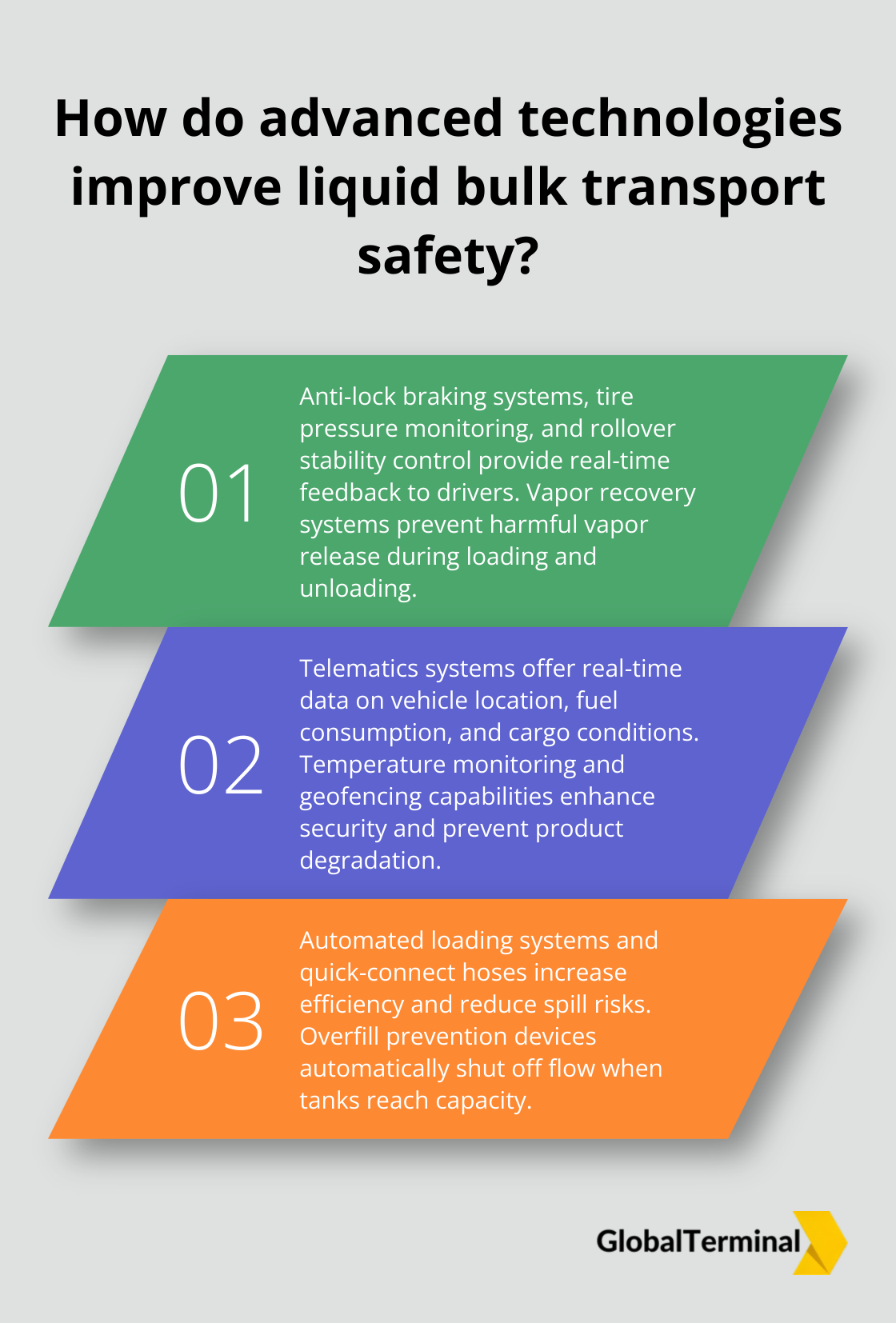
Vapor recovery systems are another critical safety feature. These systems prevent the release of harmful vapors during loading and unloading processes, protecting both workers and the environment.
Telematics and Real-Time Monitoring
Telematics systems revolutionize fleet management in the liquid bulk transportation industry. This includes maximizing the capacity of tanker trucks, minimizing empty backhauls, and optimizing delivery routes, resulting in reduced fuel consumption. These systems provide real-time data on vehicle location, fuel consumption, driver behavior, and cargo conditions.
We advise the use of telematics systems that offer temperature monitoring for sensitive cargo. This feature allows for immediate action if temperature fluctuations occur, preventing product degradation. Additionally, geofencing capabilities can alert managers when vehicles enter or exit designated areas, enhancing security and route optimization.
Optimized Loading and Unloading Systems
Efficient loading and unloading procedures minimize turnaround times and reduce the risk of spills. The implementation of automated loading systems increases efficiency compared to manual methods.
We recommend the use of quick-connect systems for hoses and valves. These systems not only speed up the process but also reduce the risk of spills due to improper connections. The use of overfill prevention devices is also important. These devices automatically shut off the flow when the tank reaches capacity, preventing costly and dangerous overfills.
Comprehensive Driver Training
Driver training is paramount in ensuring safe and efficient liquid bulk transportation. We advocate for a comprehensive training program that goes beyond basic driving skills.
Drivers should receive specialized training in handling different types of liquid cargo, understanding the unique characteristics of liquid surge, and mastering emergency response procedures. Simulator training provides a safe environment for drivers to practice handling various scenarios, including adverse weather conditions and equipment malfunctions.
Regular refresher courses and performance evaluations help maintain high standards of safety and efficiency. We suggest the implementation of a mentorship program where experienced drivers can share their knowledge with newer team members, fostering a culture of continuous improvement and safety awareness.
Final Thoughts
Selecting the right liquid bulk trailer impacts operational efficiency, safety, and profitability. We explored various trailer types, each with unique advantages for specific cargo. Capacity requirements, route analysis, and regulatory compliance demand careful consideration when choosing a liquid bulk trailer.
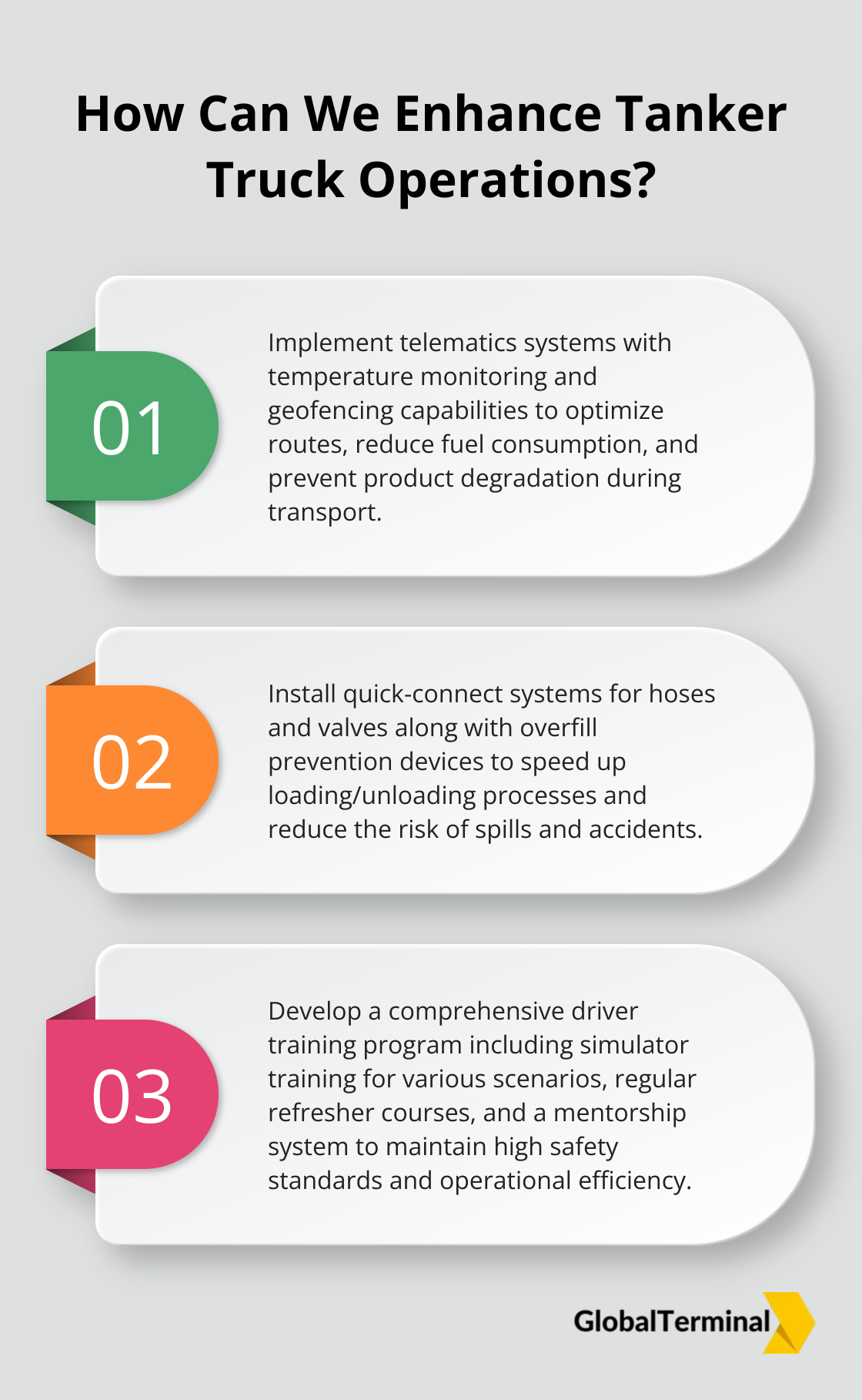
Advanced safety features, telematics, and optimized loading systems enhance operational efficiency and reduce risks in liquid bulk transportation. The industry will likely see increased integration of IoT devices, eco-friendly materials, and potential autonomous driving technologies in the future. These advancements will further improve the capabilities of liquid bulk trailers.
At GLOBAL TERMINAL NETHERLANDS B.V, we understand the complexities of liquid bulk transportation. Our expertise in fuel storage and logistics solutions across major global ports allows us to offer valuable insights into liquid bulk trailers. We combine modern facilities with robust safety protocols to ensure efficient and secure fuel handling.

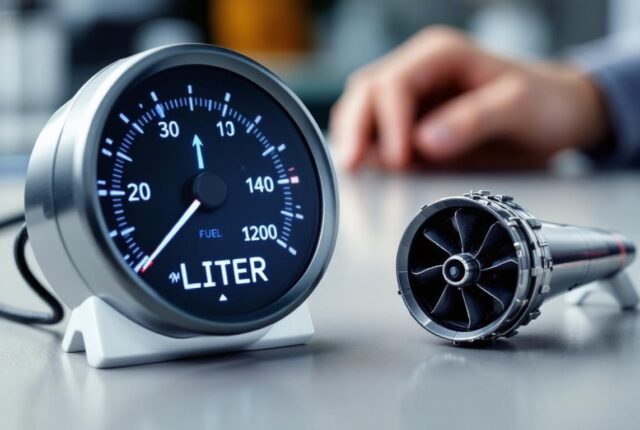

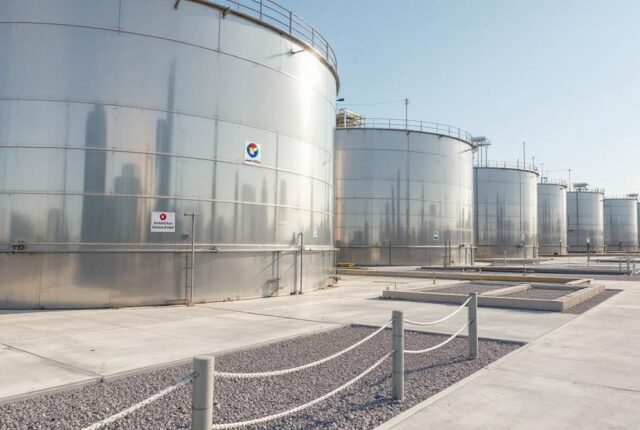

Leave a Reply